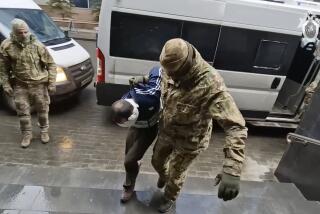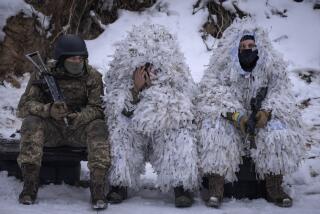In the Caucasus, a Foreign Element Threatens
- Share via
TSINUBANI, Georgia — TSINUBANI, Georgia -- In a small Georgian village where strangers are rarely seen, the foreigners bought a house and kept to themselves. Sometimes they borrowed a hammer or an ax from a neighbor, speaking broken Russian and using sign language to convey their need.
There were five Arabs in the house, according to locals in this village in the Pankisi Gorge about 30 miles from the Russian border. They had a black prayer banner pinned to an inside wall and a satellite dish, both left behind when they melted into the forests in August, along with the dozens of Chechen fighters who had made the village their base.
They also left a slogan, painted in Russian and Arabic on a shed near their house: “Paradise in the shade of sabers.”
“They lived with us and then one night they just left,” said Grigory Tsarigov, a 79-year-old villager. “We don’t know where they went. They didn’t understand our language and we didn’t understand theirs. Whatever they wanted they asked with their hands.”
Locals say the Arabs were in this remote village to fight on the side of separatist guerrillas against Moscow’s forces in the neighboring Russian republic of Chechnya.
“If you look at the village of Tsinubani, three to four months ago it was mainly occupied by Chechen fighters and Arab terrorists,” said Paata Batiashvili, head of the Kakhetia district division of Georgia’s Ministry of State Security. He is responsible for operations in the Pankisi Gorge.
Tsinubani’s Arabs disappeared. But about 15 non-Chechen foreigners, including Arab militants, have been arrested by Georgian authorities in the gorge in recent months. Some of the detainees have been linked to Al Qaeda and other terrorist groups.
Georgian officials say the foreign fighters were handed over to U.S. authorities. A Pentagon spokesman said last week that no guerrillas had been turned over to the American military. “We don’t have them. They were not turned over to us,” Maj. Tim Blair said.
The Georgian operation marked a step forward for this small Black Sea nation, whose security forces in the past were fragmented, corrupt and incompetent.
But State Security Minister Valerian Khaburdzania recently said that about 100 Arabs and 700 Chechen fighters had been in the gorge early this year before the operation began to sweep the area clean -- meaning many more have disappeared, probably fleeing to neighboring Chechnya.
“We had contacts with the leaders of the armed groups,” Khaburdzania said. “We offered their people a choice of laying down their arms and becoming ordinary refugees like everyone else or leaving our territory. Otherwise we’d have to use force against them.”
The Chechen fighters and many Arabs left quietly in small groups without a fight.
Further steps are planned to remove the 40 to 60 fighters believed to be still in the Pankisi Gorge, which borders Chechnya. About 20 are Arabs, according to Georgian officials.
The gorge has been a lawless region where money and arms have been funneled to Chechen guerrillas, particularly to Khattab, a rebel commander linked to Al Qaeda who was killed by Russian forces in March. But even as of this spring, U.S. and Georgian officials believed that only a handful of Arabs with potential terrorist connections were in the area.
In Tsinubani, some of the Chechen fighters lived in empty houses, while others stayed with locals who are Kists -- ethnic Chechens born in Georgia.
The Chechens and Arabs fled into the hills in the month before Georgian forces blockaded the village Sept. 18, running a house-to-house sweep for rebels. Seventeen Chechens were arrested, but all were found to be refugees from the war between Russian troops and rebels in their homeland. They were released.
Russian officials have demanded the extradition of eight Chechens arrested crossing from Chechnya into the Pankisi Gorge over the summer. Georgia has referred the case to the European Court of Human Rights. Five other Chechens were turned over.
Even before Chechen rebels seized about 700 hostages in a Moscow theater last month, Russian President Vladimir V. Putin had threatened military strikes to wipe out rebels taking shelter in Georgia. After the takeover ended Oct. 26 with security forces storming the theater, leaving 129 captives and about 50 rebels dead, Russia increased its pressure on Georgia over the Chechens’ presence in the gorge.
The theater siege severely damaged the Chechen cause internationally, with the U.S. embracing Russia’s line that rebel leader and former Chechen President Aslan Maskhadov should be excluded from any peace talks.
But in the Pankisi Gorge, the view among Chechens and Kists of the hostage-taking is very different.
“It was a cry of despair,” said Musa Magomedov, 31, from the Chechen city of Urus-Martan, a former fighter who carries a refugee ID card. “I know a girl from a village called Gekhi. Six of her brothers were killed. Her mother and father were killed in this war.
“A year ago the Russians took her away and they cut her body with knives and put out cigarettes on her skin. Who can guarantee that she would not pull off that sort of act [like the hostage-taking] in the future?”
Magomedov said he has given up fighting, though he still has a good pair of military boots by his door. He left Chechnya in 1999 “because I did not want to be slaughtered like a lamb.” But he’s sure his year-old son will one day be a rebel fighter.
“I’ll teach him that he should take up arms and fight,” Magomedov said. “I’m just a patriot. My heart aches for the Chechen land. Maybe my son will be the next shahid [martyr] in our family.”
Russia’s military campaign in Chechnya has been condemned by human rights organizations, which in particular criticize the zachistki -- mopping-up operations -- in villages where Russians sweep in, seize dozens of men and boys, many of them civilians, and loot and pillage. Many of the detainees are never seen again.
But after the Sept. 11 attacks, U.S. disquiet about links between the Chechen rebels and Al Qaeda led the Bush administration to mute its criticism of Russia’s military campaign.
American fears were confirmed when Georgian intelligence said that about 100 Arabs were in the gorge at one point. The reported arrest of Saif al Islam el Masry, a member of the Al Qaeda military committee, in the area this summer was further confirmation of the terrorist threat.
Batiashvili, the Ministry of State Security official from Kakhetia, which includes the gorge, said the Arabs in the Pankisi opened a powerful communications center in the village of Lower Khalatsani. In recent months, security forces have confiscated CD-ROMs with terrorist training manuals; satellite phones, dishes and phone interception devices; radios and two carloads of military uniforms.
“We closed down two Arab schools in August. Every single fighter had a sophisticated radio. In the State Security Ministry, we don’t have the kind of equipment they had,” Batiashvili said. “There were many terrorist training manuals on how to take hostages, how to make explosive devices, defensive and offensive operations, how to shoot down planes.”
Batiashvili said messages uncovered by security forces also suggested that the Arabs were planning terrorist attacks against Russian or Western targets in the region.
Kakha Kobakhidze, chief of Georgia’s Internal Security Department, said forces found videocassette recordings of rebel attacks in Chechnya -- including killings of civilians.
“I saw one cassette with a Russian woman crossing the road with her child. They fired a grenade at them and the woman was left alive, but her child was blown up. She was left holding just her child’s arm,” Kobakhidze said.
Nika Laliashvili, spokesman for the Ministry of State Security, said that among the Arabs were religious emissaries, financial couriers and fighters with links to terrorist organizations.
“They spent two years sitting there,” he said. “It was comfortable. They were recruiting people to fight in Chechnya through the Internet.”
After Russia’s sharp threats of military intervention, Putin and Georgian President Eduard A. Shevardnadze met early last month and reached a deal on greater cooperation between both nations’ border guards and intelligence services.
That deal eased Russia’s pressure on Georgia -- until the Moscow hostage crisis created new tremors in the relationship.
The departure of most of the fighters, without major bloodshed or loss of civilian life, is something Georgian officials are quietly gloating about. But they face another threat in coming weeks. With Russia launching operations in Chechnya in retaliation for the Moscow hostage crisis, there is a threat that the Chechen and Arab fighters who deserted the Pankisi Gorge might be forced to return.
The mountain passes will soon close for the winter. If the fighters stay in Chechnya, they face the threat of annihilation. If they return to Georgia, Russia will demand their extradition, creating a new political headache for Georgia.
*
Times staff writer Esther Schrader in Washington and Alexei Kuznetsov of The Times’ Moscow Bureau contributed to this report.
More to Read
Sign up for Essential California
The most important California stories and recommendations in your inbox every morning.
You may occasionally receive promotional content from the Los Angeles Times.













